A Quiet (election) War In the Ukraine
by David Sadler
www.david-sadler.org
Published 2004.11.27
It¹s clear a double standard is being applied to the 'certification' of the elections just held in both the US and the Ukraine. [About the Ukraine...]
Does anyone wonder WHY the US is so adamant about 'FAIR' elections in the Ukraine, on the other side of the earth, but is eager to quell any talk of vote fraud in the recent US elections?
How many elections have occurred globally over the last four years? How many of those elections were fraught with fraud? Why has the Bush administration and the European Union (EU) become so animated over the Ukraine elections?
Kremlin-backed Prime Minister Viktor Yanukovych 'won' the Ukraine election. He’s Putin¹s guy.
Opposition candidate Viktor Yushchenko 'lost' the election. He’s "the West's" guy.
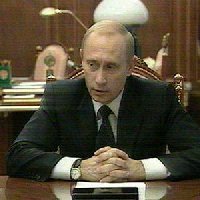

+ (left) Vladimir Putin - image: Europa Press
+ (right) Viktor Yanukovych - Image: the free dictionary


+ (left) George W. Bush - Image: GOP.com
+ (right) Two images of Viktor Yushchenko.
The radical change of appearance is said to be the result of poisoning.
Image credits unavailable.
Why is the West so interested in the Ukraine that Secretary of State Colin Powell is saying things like this?
"We cannot accept this result as legitimate, because it does not meet international standards and because there has not been an investigation of the numerous and credible reports of fraud and abuse." (1)If you guessed that the US does not become engaged in the central Eurasian Balkans (Zbigniew Brzezinski's term) unless there is oil or security for Israel at stake, you are correct.
In this case it is Caspian Sea oil and several proposals for western rights-of-way that bypass Russia on its way to former Soviet republics and western Europe in which the Ukraine figures heavily. (2, 3, 4)
Caspian Sea oil has been beset by problems of how to transport it to the major consuming nations. A more direct route across 'politically stable' rights-of-way are demanded. Heading west instead of east may be the answer since 'stabilizing' Afghanistan is proving difficult.
But there's a problem with the western route --- Russian national security interests regarding former Soviet republics and Russian territory.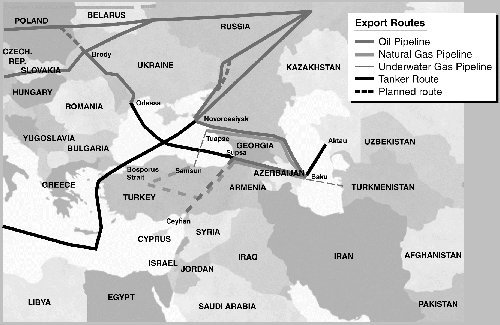
RAND Corp Map showing proposed oil pipeline routes from the Caspian Sea to western Europe and the Odessa-Brody pipeline to Poland through the Ukraine.
Full size map.
With increased demand upon and uncertainty regarding the dependability of Middle East oil, demand for Caspian oil will continue to grow. Demand is now so high that the problem of Russian resistance is on the front burner.
It's this growth in demand for Caspian Sea oil that is fueling tensions throughout the region as well as precipitating the current Ukrainian election crisis - a crisis that may lead the major players (US, EU, Russia) to ignite war in that area under the pretext 'civil' war.
Caspian Sea Region
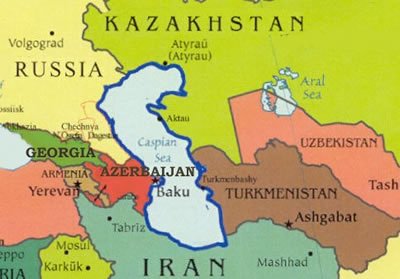
-- Map by US Department of Energy, Energy Information Administration --
GENERAL BACKGROUND The Caspian Sea has become a landmark for the former Soviet South’s untapped oil and natural gas potential. Herein, the Caspian Sea Region is defined to include the Sea's littoral states of Azerbaijan, Kazakhstan, and Turkmenistan, as well as parts of Russia and Iran and also Uzbekistan --which although not a littoral state, is the region's largest natural gas producer. The oil and gas potential of these states is sizeable. Proven oil and natural gas reserves have been estimated at up to 3% and 4% of the world total, respectively, and analysts expect that by 2010 regional oil production will meet or exceed 2002 capacity in Venezuela, South America's largest oil producer. -- Caspian Sea Region, US Department of Energy, Energy Information Administration --

Map source, BGR, the German Federal Institute for Geosciences and Natural Resources in Hanover, May 2000
Colouring on map shows countries with largest gas depositsOne might ask how the west expects to get the oil from the Caspian Sea to the Ukraine and western Europe with Russia situated between them. The following map and comments answer this question and also demonstrate the motive behind the keen interest and aggressive intervention of the US into the politics of Georgia and the Ukraine, upsetting Moscow in the process. And now you know why the US has its sights on Iran and is engaged in Afghanistan (as an alternate eastern route).
Red = countries with more than 20 trillion m3 of natural gas reserves (i.e. Russia and Iran)
Click here to see full map including the Americas
Will the hydrocarbon era finish soon?
Geosciences in Exploration and Production: Information exchange for research and Industry, Hanover, 23.05.2000
A glance at the map shows that much of this global oil and gas ‘strategic ellipse’(which also covers associated crucial transit routes to ports on the Indian Ocean, the Mediterranean and the Black Sea) coincides with where the United States is immersed most directly in confrontations of great geopolitical tension. The key regions within the ellipse are:
1. Persian Gulf
2. Central Asia/Caspian/Caucasus
3. Western Siberia
(for a more detailed map of oil and gas reserves in this region see: 'Putin Strikes Back - Peak Oil Era Struggle For Power Intensifies')
-- text and map from "Peak Oil To Arrive As Early As 2014" at www.btinternet.com
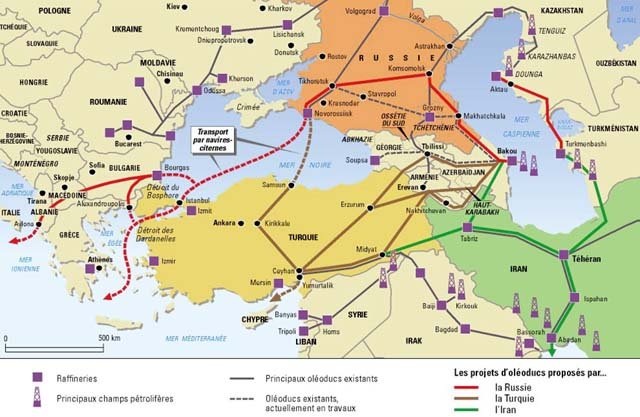
Oil Routes map and following comments from: Oil Routes by Philippe Rekacewicz, Le Monde Diplomatique
Hydrocarbons from the Caspian Sea used to be routed through the Russian Federation, but Turkish and Iranian plans to skirt round Russia’s southern border and run pipelines through the Caucasus are a challenge to Russia’s monopoly.
See article by Jean Radvanyi, “Transport and geostrategy in southern Russia”, June 1998.
Sources : UN Information Centre in Paris
List of available maps...
ALL RIGHTS RESERVED © 1997-2004 Le Monde diplomatique.
The EU and the US have allied against Russia over the battle for political control of the Ukraine. The prize is access to Caspian Sea oil and its transmission to Europe. It has nothing to do with free and fair elections. Whoever can steal this election and have the final say on the matter will be the 'victors,' and to the victor goes the spoils.(7)
The patience of Vladimir Putin, President of the Russian Federation, is growing short with US interference in Russia's back yard and with threats to Russia's national security.
Earlier this year there was a parade of high US officials to the former Soviet republic of Georgia. Then there was the involvement of Westerners, particularly from the US, in the demise of the Russian oil company Yukos. Then there was perceived western involvement in the Russian school hostage slaughter that western media blamed on the Chechnyans. Now there is US intrusion into the elections of the Ukraine because the US favorite, Yushchenko, did not 'win.'
Among other responses to ongoing US meddling in Russia's affairs and in Russia's back yard, we see Russia developing new ICBM/MIRV and decoy configurations to counter-measure the US NMD.



+ Left image Russian SS-X-27 Topol-M road-mobile ICBM by Global Security
+ Middle and right images of deployed warheads by Institute for Foreign Policy Analysis
SS-27Russia's options to counter this bold Western move to 'democratize' the Ukraine, and steal its elections in the process, exclude a direct conventional military conflict with the US.
Country: Russian Federation
Alternate Name: Topol-M, RS-12M1/M2
Class: ICBM
Basing: Silo based, road mobile
Payload: Single warhead
Warhead: Nuclear 550 kT
Propulsion: 3-stage solid
Range: 10,500 km
Status: Operational
Russian Designation: RS-12M1/-12M2 Topol-M
The Russian SS-27, or Topol-M, is an intercontinental-range, ground-based, solid propellant ballistic missile. It represents the pinnacle of ballistic missile technology, incorporating modern fuel and warhead designs, as well as being capable of being launched from both missile silos and Transporter-Erector-Launcher (TEL) vehicles. Current Russian accounts stress that the SS-27 is invulnerable to any modern anti-ballistic missile (ABM) defenses. Yuriy Solomonov, director of the Moscow Institute of Heat Technology and designer-general of the Topol family of missiles, has stated that the SS-27 will be the foundation of the Russian strategic nuclear arsenal by 2015.
The SS-27 is currently portrayed by Russian accounts as being immune to any ABM defense the United States can put into being. The missile is capable of making evasive maneuvers as it approaches its target, enabling it to evade any terminal phase interceptors. It almost certainly also carries countermeasures and decoys to decrease the chances of a successful targeting. The missile is shielded against radiation, electromagnetic interference and physical disturbance; previous missiles could be disabled by detonating a nuclear warhead within ten kilometers. This vulnerability is the basis behind the use of nuclear ground-based and orbital interceptors, to detonate or damage the missile before it reaches its target. However, the SS-27 is designed to be able to withstand nuclear blasts closer than 500 m, a difficult interception when combined with the terminal phase speed and maneuverability. While the boost phase is the most vulnerable time for the SS-27, it remains protected. Hidden safely within missile silos and mobile launchers, a successful boost-phase interceptor would have to be fired from near or within Russian borders or from space. And the SS-27 is also designed to survive a strike from any laser technology available, rendering any current space-based laser useless. The missile highlights the need for considerably more research into missile defenses, as the United States is currently defenseless while Russia is protected by a functional defense system.
-- Missile Threat --
Russia is instead pursuing a course of economic warfare by converting Dollars to Euros and moving the trade of oil into Euros. Russia is also pushing for the secession of eastern Ukraine from western Ukraine along the natural course of the Dnipro River.
Interestingly, Russia is being joined by nations the world over in this migration to the Euro as both currency and as the standard trade currency for oil. This should tell Americans something about how the world views America's aggressive and irresponsible foreign and fiscal policies. (6)
Secession by eastern Ukraine, on the other hand, could complicate the western attempt to co-opt the western oil pipeline routes by-passing Russia, although the Odessa-Brody pipeline route through western Ukraine could still by-pass eastern Ukraine and Russian control should secession succeed.
Secession by the eastern Ukraine, while not completely blocking the movement of oil from the Caspian to western Europe and Poland, would maintain much of the Ukraine's industrial capacity under Russian influence upsetting many western corporate interests who see a 'democratized' Ukraine as a bonanza.
Secession of eastern Ukraine would be a bitter pill for the west but acceptable. (8) What seems to be not acceptable to the west is the prospect of 'losing' the recent Ukraine election - thus losing western Ukraine and the Odessa-Brody pipeline route among other alternatives.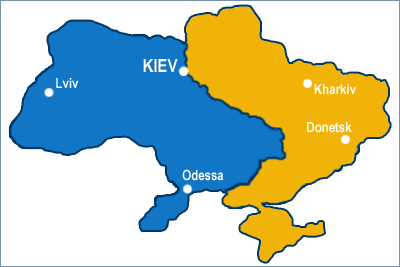
Map of proposed east/west division of Ukraine
along the natural course of the Dnipro River by MosNews
Frankly, I'm having difficulty seeing the significance of western Ukraine to the oil pipeline routes to western Europe and Poland. There are other alternatives, but when organizations such as RAND and the Institute for Advanced Strategic & Political Studies emphasize these oil routes through the Ukraine, one must study the maps and situations very carefully before dismissing the points being made.
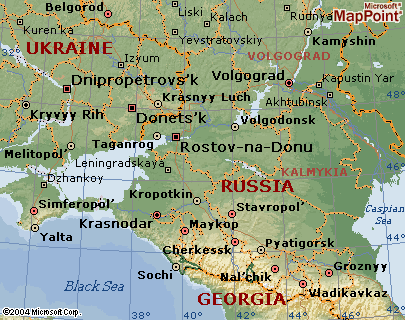
map by encarta.msn.com
To this author, the real target seems to be strategic control of the entire region including Georgia and that protion of Russia that separates the Ukraine from the Caspian. No doubt, the west wishes to control the entire Caspian Sea region out to the sea lanes in all directions - east, west and south. This is why the US is so eager to place military bases in Georgia and the Ukraine.
Tensions between Russia and the US are as high now as they've been since the First Cold War. These tensions will build as competition for oil continues to increase. (5)
At this point, one must be reminded that Russia under Putin is no friend of those who value peace and individual liberty any more than America is under Bush. It is completely possible and highly probable that the Kremlin was involved in the poisoning of Viktor Yushchenko. We are, after all, talking about the KGB.
The forces vying over political control of the Ukraine land mass are doing so, not because of the ideal of free and fair elections. This political battle is over oil, among other corporate, economic and strategic interests, and for all sides, the end justifies the means.
US foreign policy is also agitating another major player in world affairs --- China. China is responding by forging oil deals with Venezuela and Iran, selling its US instruments of debt, converting Dollars to Euros and warning the US to not interfere in China's affairs.
Now that China is moving into the Middle East oil picture, competition for the world's major oil supplies is becoming more intense for everyone. Soon, even the skeptics of Oil Wars will have to face the reality that oil is a, if not the, prime factor driving the foreign policies of the major industrialized/militarized nations on Earth.
The great, great mass of Americans are oblivious to these developments just as they have finished giving thanks for the bounty and blessings enjoyed by this nation.
Americans see the Ukraine election 'news' on TV and marvel at how corrupt their election system is, without a single clue as to US complicity in the subterfuge there.
Americans are interested to hear Colin Powell and George Bush getting very serious and aggressive about this alleged vote fraud in the Ukraine, but are ready to dismiss any talk or thought about vote fraud having just occurred in the US.
And yet, not a single voter in the US can prove even to him/herself that their ballot votes were counted as they were cast in the November 2004 elections.
We can't do much about the election events unfolding in the Ukraine, as the dam has already been breached, and that wall of water is now impossible to hold back. But we can do something about the US election system and about our foreign and domestic policies. Such change will require a new way of thinking and a new approach to how we campaign, raise funds and conduct our elections. We had best get to it while we are still strong.
David Sadler
Www.david-sadler.org
David Sadler ran for Congress in the 12th Congressional District of Illinois in 2002 as a Republican. He advocates debates commence immediately between neo-conservatives and traditional conservatives. He maintains the neocons have hijacked the GOP, but that the neocons do not speak for traditional, liberty-minded conservatives. Energy independence through a Manhattan class national effort to develop New Energy sources is a corner stone of his plan to diminish the threat of terrorism against Americans and reform American imperialist foreign policies.
NOTES:
0) google: ukraine oil caspian
1) Powell: U.S. Rejects Ukraine Vote Results
By BARRY SCHWEID
AP
Nov 24, 2004
2) Ukraine and the Caspian: An Opportunity for the United States
Olga Oliker
RAND Corp
Published 2000 by RAND
3) Standing Up to Putin's Imperial Ambitions
by Vladimir Socor, a senior fellow of the
Washington-based Institute for Advanced Strategic & Political Studies
The Wall Street Journal Europe 09.19.2003
4) Ukraine to Pump Caspian Oil Despite Agreement with Russia
- Ukrainian Ambassador to Poland
CPCFPU
25.08.2004
5) Caspian Sea Region
Energy Information Administration
Official Energy Statistics from the U.S. Government
United States Department of Energy
6) Dollar plumbs new lows on talk of central bank selling
Business - AFP
2004.11.23
7)US campaign behind the turmoil in Kiev
Ian Traynor
The Guardian
Friday November 26, 2004
8) Pro-Russian Eastern Ukraine Threatens to Secede if Yushchenko Wins Created: 26.11.2004 19:07 MSK (GMT +3), Updated: 19:07 MSK MosNews
Related news stories since publication
• Two Ohio election workers found guilty; supervisors get off scot free
blackboxvoting.org
1-24-2007
• Prosecutor says presidential recount rigged in Ohio county
Associated Press
Posted on Thu, Jan. 18, 2007
• Ohio recount lawsuit set for trial; election workers indicted
freepress.org
September 4, 2005
• Rude awakening to missile-defense dream [alt] // Scott Ritter
• Ukraine election win challenged
• Yanukovich refuses to accept defeat
• Ohio GOP election officials ducking subpoenas ...
• Israel Accused Of Obstructing Palestinian Election
• Yushchenko Declares Victory In Ukraine Election
• The Political Crisis in The Ukraine
• Ohio Recount Stirs Trouble
• Republican IT Specialist Dies in Plane Crash [Michael 'Mike' Connell]
• Powell: U.S. Rejects Ukraine Vote Results
• Afghanistan Pipeline // compendium that links to this article
• Ukraine's government collapses, BBC, James Rodgers reports, 16 September 2008
"Ukraine's ruling pro-Western coalition has collapsed plunging the country into a new political crisis. Parliament now has 30 days to try to form a new coalition, or call a snap election."
Click here to view video report.